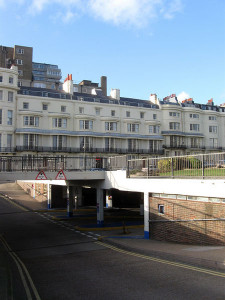Lord Bassam of Brighton has urged the government to give better support to seaside towns in a debate in the House of Lords.
While Brighton was a notable exception, he said, many seaside towns suffered a number of similar problems, not least being “left out and left behind” and “at the end of the line”.
They often suffered from poor transport links, rundown housing and limited access to education.
Lord Bassam, better known locally as former council leader Steve Bassam, also mentioned the potential benefits of art-led regeneration, more vision and better leadership.
He is widely credited with laying the foundations for the revival of Brighton seafront and coming up with an economic strategy for the town while many other resorts faded.
As chair of the House of Lords Select Committee on Regenerating Seaside Towns and Communities, it could be argued that he is now trying to encourage others to emulate his success.
His committee published a report in April – The future of seaside towns – setting out the issues as well as highlighting a variety of potential solutions.
Yesterday (Monday 1 July), in a debate lasting more than three hours, the Labour peer said that his cross-party committee’s report was “more than a wake-up call to those involved in government – locally and nationally”.
He said: “If action is not taken soon to reverse the decline of many of the communities the report covers, the problems associated with them will become intractable and irreversible.
“The resentments that have led to a sense of these communities feeling left out and left behind in our nation’s story will become permanent.
“The report is all about finding a renewed sense of purpose for the seaside – and a route map.
“None of this comes without a cost but, with leadership and a vision for the future, we believe that the UK seaside can be transformed.”
Lord Bassam also said: “We observed inadequate transport connectivity, holding back many coastal communities and hindering their economic potential.
“We asked for a detailed review of the coastal transport network to assess where the greatest socio-economic benefits can be realised through improvement to transport links.
“We commented on the need for improved digital connectivity, presenting a significant opportunity to overcome the challenges of peripherality that persist in coastal areas. The provision of high-quality broadband in coastal locations should be a priority.

“We commented on the cost of post-16 transport as an impediment to accessing educational opportunities. We recommended that the government fund relevant local authorities to provide full public transport costs for post-16 students.
“Poor-quality housing was among the significant problems reported by residents of seaside areas.
“We therefore recommended a package of measures to tackle issues related to housing, including measures to address the perverse financial incentives to offer poor accommodation.
“Recommendations around easing the pressures on inspection and enforcement regimes, and measures to support more regeneration of existing housing, were offered.
“Finally, we felt that a variant of enterprise zones specifically designated for coastal areas could offer seaside towns a package of interventions to meet the challenges of peripherality, poor connections and the difficulty of attracting private investment and businesses to those areas.”
Lord Bassam added: “The government’s response was helpful in some ways, but rather disappointing in others.
“It recognised that, ‘coastal communities are comparatively more deprived and on average underperform economically in comparison to other areas,’ and that, despite investment to date, ‘there is more that needs to be done by government and all stakeholders.’
“Many have seen a decline in their traditional core industries, most notably domestic tourism, but also fishing, shipbuilding and port activity.
“Much of the economic activity is linked to seasonality and their location on the periphery of our country – literally at the end of the line – places them on the periphery of the economy, bringing consequential social problems.
“The case we made, based on the evidence we received, is that what makes these areas distinct is the combination of industrial decline and geography – and that it is this combination of challenges that warrants dedicated attention and special intervention and support for those communities.
“Although the government’s response acknowledges that coastal communities are at a particular disadvantage, sadly it failed to give its support for many of the targeted interventions suggested by our report.
“The response indicates that the government will act on some of our recommendations, including around transport costs for young people, accessing education and apprenticeships and considering a town deal for Blackpool – and that they will consider the points we raised on coastal flood risk investment decisions as part of the preparation for the next flood and coastal erosion risk investment programme, due to start in 2021. We clearly welcome these commitments.
“We welcome the government’s commitment to reinstate the cross-Whitehall official-level meeting which we hope will help provide a more strategic approach to coastal communities’ policy-making.
“There was, however, no detail provided on when these meetings would commence, how regularly they would occur – they have not occurred for nearly 10 years – and what format they might take.
“A meeting in Whitehall is not a solution to the problems experienced by people living by the coast.
“Our recommendations on housing included a comprehensive package of measures aimed at tackling the distinct housing issues residents of seaside towns feel. These relate to the prevalence of poorly managed HMOs (houses in multiple occupation).
“The government’s response listed the tools that local authorities can use to tackle problem HMOs but failed to take into account the evidence we highlighted that suggested that local authorities in some areas feel that they do not have the resources to use those tools effectively.
“We welcome the government’s positive response on post-16 transport. We will be interested in the outcome of the plans laid out in the response for action at ministerial level to address the question of how to ensure that young people are not deterred from taking up apprenticeship opportunities due to travel costs.
“We also made a plea for arts-led regeneration which we think the government has ignored to a greater degree.
“The government’s response suggested that there were no plans for additional enterprise zones and listed programmes such as the coastal communities fund and the coastal revival fund as measures already in place.
“The report stands as a critique of current public policy, in so far as it exists, on coastal communities. It points to the real problems that continue to exist and have worsened over recent years in health, housing, economic prosperity, transport disconnection and education.

“It is a shocking fact that over the last seven years educational aspiration in coastal communities has regressed, with 27 per cent fewer young people from coastal areas getting into university and no evident signs that training and apprenticeship opportunities have taken up the slack.
“Social mobility is lowest in those communities. There is real sense that seaside areas, the end-of-the-line places we all love, are missing out on the wealth generated in our metropolitan centres and heartlands. Residents of such areas feel left behind.
“Given that some four million people live on the coast and that the coast is a major tourist opportunity for the nation, we need urgently to reverse many of the trends bedevilling coastal prosperity and social inclusion.
“Our report is a starting point and a way forward.”
A junior minister, Lord Bourne of Aberystwyth, also known as Nick Bourne, replied for the government. He said: “I am most grateful for the many valuable contributions made today, which highlight how much we all value our coastal towns … how important it is to ensure that they have the ability to grow and prosper into the 21st century and how we put right some of the things that have certainly gone wrong.
“The conversation has been frank and honest and has given us much to consider.

“I thank the noble lord, Lord Bassam, for securing this debate and enabling us to discuss this very important issue, for the obviously consensual way he has ensured that the committee has looked at these issues and for coming forward with a unanimous report, which I am sure makes it the stronger.
“The work that the noble Lord and his committee have undertaken has been very thorough and highlights the many challenges facing our coastal communities in the 21st century.
“The debate has examined many of the challenges and it has been encouraging to hear many positive suggestions.”
Lord Bassam made a few final pleas, saying: “First, we should look at the seaside and the coastal communities not with a sense of nostalgia but with a sense of opportunity and as a challenge.
“The strength of this report is that everyone in the committee was happy to sign up to it. It is content-rich, it is bursting full of ideas and it is not complacent.

“It makes specific demands of government. The demand we need to reinforce today is this: we cannot ignore the seaside communities as they have been over the past decade since the last report.
“We need to persist and continue to press the government. It is for the government’s own good to keep seaside towns and communities at the forefront of our thinking.
“Colleagues have covered the territory well. Education, housing, art-led regeneration, the need for more entrepreneurship, more vision and better leadership have all been dealt with extremely well in the debate.
“Government has a challenge here. I shall continue to press the case for our coastal and seaside communities.
“The measures, proposals and recommendations contained in the report need to be agitated for, pursued and concentrated on over the next months and years.
“The problems will not go away and they will only get worse if we ignore them.”












What a complete load of B S
‘He is widely credited with laying the foundations for the revival of Brighton seafront and coming up with an economic strategy for the town while many other resorts faded.’
What foundations? The ones underpinning the madeira terrace arches or the loss-making i360.
He’s the main one responsible for turning Brighton into the student infested dump it now is – and as a former unwashed squatter and freeloader, he showed his true colours recently as a ‘Lord’ by trying to fiddle 15 odd grand of travelling expenses to the House of Lords – An undemocratic institution that serves no useful purpose and should have been dismantled umpteen years ago.
Hmmm, I think you’re being a bit generous about the state of Brighton in the past. 25 years ago large swathes of central Brighton were derelict or squatted, and the seafront was a run-down dump. Things have definitely improved in some ways, although we’re now grappling with new problems of unaffordable housing and integrating student populations into resident areas.
Who are you trying to kid? You can delude yourself but please don’t be ignorant and stupid enough to try and delude me. I have lived in Brighton my whole life and I can assure you that Brighton seafront was in better condition in 1994 than it is now and large swathes of central Brighton only happened to be car parks. The Astoria cinema was derelict then and is only this year being developed.
Why don’t you take a cycle ride from sealanes on madeira terrace, turn right at the palace pier roundabout then go all the way along the Lewes Road corridor to Wild Park – Oh and open your eyes and look at and take in what you pass through.
We are little more than a beach for tourists to litter with plastic, glass and barbecue debris, a low-income economy and, increasingly, a dormitory town serving London commutees. Every new major planning applicatiion is for big blocks if flats and little more.
Employers leave the city when they grow to a certain size for lack of anywhere to grow into.
Only the digital sector produces any wealth – because less space need?
This man has had 40 years to do something at the end of the line.Now he gets £300 a day appearance money.40,000 students living in the City and he and his chums never had the foresight to see that he has driven families out of the City because family homes have been turned into HMOs never mind his squatting days are well behind never mind about the Homeless.
The-end-of-the-line situation could be improved for several places on the South Coast if the railway link between Lewes and Uckfield were restored.
This would take pressure off the line from Victoria (talking of which, perhaps in tribute to Wilde’s great dialogue the Brighton line should be re-named the Handbag line).